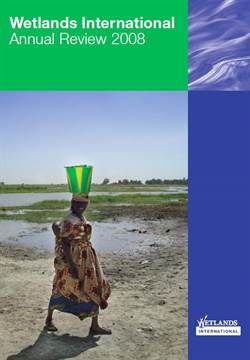
Annual Review 2008
The Annual Review 2008 charts the main achievements, as well as projects, finance and publications of Wetlands International during 2008. Furthermore, it highlights our work in relation to climate change adaptation and on incentive mechanisms for community-based wetland management. As you can read in the Achievements and projects sections of this review, Wetlands International was highly active in all regions during 2008. The outcomes that we achieved in 2008 are important in themselves, but most are just steps towards much longer-term goals to bring about lasting benefits to people and nature.
The review over the past year demonstrates the growing relevance and impact of our work worldwide. We have been able to realise some significant gains for wetland conservation and restoration, for example for peatlands under threat in Central Kalimantan, Indonesia, Ruoergai, China and Tierra del Fuego, Argentina.
Together with many local communities we have restored degraded coastal wetlands in West Africa and Southeast Asia. We have worked with many partners and networks to achieve significant positive gains for wetlands through improved international biofuel standards and climate change policies.
These achievements are a testament to the dedication and skill and teamwork of many staff in offices around the world; as well as to the support of a growing number of global and local partner organisations, members, donors and volunteers.
Significantly, we were able to bring critical information on the links between peatland degradation and CO2 release to the world’s attention – resulting in some unprecedented policy shifts by the European Union to limit the impact of biofuels on wetlands. Thanks to the support of a growing number of governments and NGOs, we have ensured that wetlands (and especially peatlands) are on the agenda of the critical climate dialogue and detailed negotiations occurring in 2009. We now need to further define and demonstrate credible solutions. In particular we need to demonstrate how wetland management and restoration can contribute significantly to climate mitigation and adaptation – and how governance and finance mechanisms can best support this. Our experience in facilitating community-based wetland management in different regions and our networks of members, partners and scientists will be invaluable in this respect.
The outcomes that we achieved in 2008 are important in themselves, but most are just steps towards much longer-term goals to bring about lasting benefits to people and nature. In this respect, we are especially pleased to have been able to support the training of hundreds of African government staff on the links between poverty reduction and wetland management and to help secure partnerships and finance for on-going work in this field. Another example comes from our role in developing the global wetlands knowledge-base. We took some important steps in 2008 to develop and apply web-based tools that support wetland planning and management at a range of geographical scales – such as the Critical Sites Network of the African-Eurasian flyway. We see great potential to extend this partnership approach, bringing together wetland databases to provide integrated tools for conventions, national governments and wetland managers alike.
2008 was a year which also brought some important institutional developments. It was the final year of the 10 year residence of our headquarters in the Wageningen University buildings. Thanks to some financial assistance from the Netherlands government we were able to make arrangements to rent and fit-out a new, self-contained office just a few kilometres away in a woodland setting, near the Ede-Wageningen train station. This office provides an excellent working space for staff and is very convenient for visitors.
After some years of planning, we also established a new office in Panama, hosted by the Ramsar CREHO centre, to develop our partnerships and activities on “wetlands and livelihoods” within Latin America and the Caribbean. We welcomed Julio Montes de Oca as the Programme Development Officer for this office. In Africa, we were delighted to appoint Ibrahima Thiam as Regional Director. During 2008 he restructured and expanded his team and relocated our regional Africa office in Dakar. During 2008 we also marked the retirement of two regional Heads of Office: Seydina Issa Sylla who had earlier played an important pioneering role for Wetlands International in West Africa – and Dibjo Sartono who enjoyed over a decade as Director of our Indonesian Programme, based in Bogor. We thank them both for their important contributions to the work and achievements of Wetlands International. In 2009, the headquarters warmly welcomed Frank van der Valk as Chief Operations Officer. Frank joined Wetlands International from Oxfam Netherlands and works alongside me in the Management Board.

